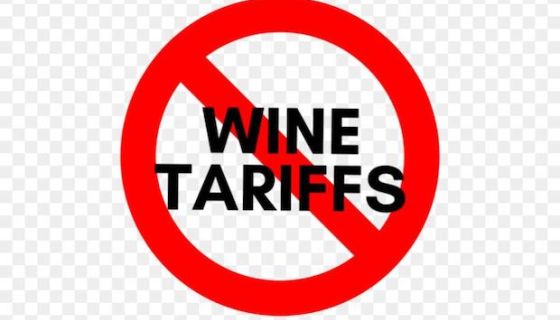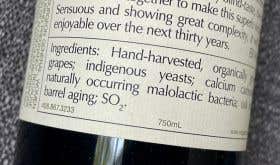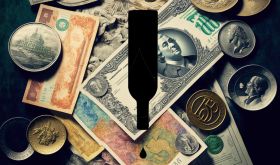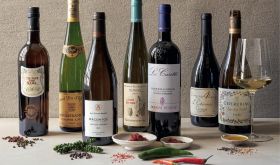15 January An encouraging letter has been sent to the USTR by 106 members of a bipartisan wine caucus within US Congress urging these tariffs not to be applied to wine. Furthermore, a letter and petition from more than 200 European wine producers has been sent to senior EU officials and Phil Hogan, European Commissioner for Trade, who was due to visit to the US yesterday.
13 January So what happened last week when the American wine trade met US government officials to argue against a 100% tariff on imports from Europe?
A clamour in the American wine media reached fever pitch last week, after several weeks of increasing consternation. The hubbub surrounds two separate tariff proposals by the Trump administration. The first, announced 2 December in response to France’s imposition of a Digital Sales Tax (DST) on tech giants such as Apple, Google and Amazon, would impose tariffs of up to 100% on champagne as well as French cheese, handbags and various other goods. The second, announced 11 December, would levy a 100% tariff on all European wines in response to EU subsidies for Airbus that have long been violating World Trade Organisation rules. This additional tariff proposal comes on the heels of an initial action in response to the Airbus subsidies: a 25% tariff on French, German, Spanish and English still wines under 14% alcohol (plus Scotch and Irish whiskey) that has already caused significant pain for American importers, distributors and retailers since it was imposed on 19 October.
These newly proposed tariffs would immediately double the price of all European wines and would, as pretty much every wine journalist in America has noted in the past two weeks, likely result in catastrophic damage to thousands of small businesses involved in the importation, distribution and sale of such wines to American consumers.
The best and most provocative illustration of the American wine industry’s feelings on this issue might be the fact that the Wine & Spirits Wholesalers of America and the National Association of Wine Retailers, two organisations that without fail find themselves on opposing sides of every legal matter they care about, have both publicly decried the proposed tariffs and are presently lobbying hard against their imposition.
Before implementing such measures, the Office of the United States Trade Representative must make their proposed rules open for public comment, and as one might expect, the comments from the wine industry have been flooding in. Today is the deadline for comments on the most recent 100% tariff proposal and you are strongly encouraged to leave a comment if you are reading this on the morning of Monday 13 January regardless of whether you are an American. See our alert to this possibility a week last Friday; to date more than 19,300 comments have been received.
In addition to receiving public comments on both the proposed tariff schedules (one focused on DST which would further increase the tariff on French sparkling wines, the other that would potentially slap a tariff on all European wines), the USTR conducted a hearing on 7 January in Washington DC on the proposed DST tariff, which was accomplished in part by a conference call on 8 January since much of the nation’s capital was shut down the previous day because of worries over a winter storm. Because the proposed tariff on all European wines is merely an extension or modification to the tariffs imposed on 19 October, a hearing has not been scheduled for this even more comprehensive tariff action. It is unclear whether or not one will be held. Hence the wine industry’s focus on this particular hearing.
The DST hearing last week featured seven panels of speakers, including many well-known names from the US wine trade in various capacities from importers to distributors to retailers.
‘There was definitely tension in the room’, reported Valerie Corbin, the Import Operations Manager for Bonhomie Wine Imports, a small New Jersey importing company. She, like so many of the other members of the wine industry in attendance, arrived with the sense that her very livelihood was under attack.
Corbin drove to Washington DC to offer ‘moral support in person’. Said Corbin, ‘No one else in the company could afford to take the day off, and I wasn’t even sure if I was allowed to attend, but I emailed the person listed as in charge on the government website, and they got back to me within 10 minutes and said “Please come, please attend and bring all your friends.”’
Corbin sat in the middle of a large room filled with chairs one might find in any corporate conference room. She described at the front of the room a ‘courtroom-style’ raised platform, with tables and microphones arranged in an arc, behind which sat the seven members of the panel representing various government departments including the Department of the Treasury, the State Department, Customs and Border Protection, the Department of Commerce, the International Trade Administration, the Department of Agriculture, the Small Business Administration and the office of the US Trade Representative.
In front of this were arranged several rows of narrow tables with microphones at which members of the public invited to testify were arranged in panels of four to six individuals.
‘At the far left, there were tables crammed with secretaries and staffers, and in the very back right-hand corner there were three tables filled with press’, reported Corbin, who was slightly disappointed in the initial scene. ‘The room wasn’t full by any means. There were probably 50 people like me attending in the audience, but room for perhaps 200. There wasn’t enough of the public there. I mean, where were the DC sommeliers? I feel like there could have been a bunch more warm bodies representing [our industry].’
The two days of hearings involved five-minute presentations from each of 36 individuals, the great majority of whom (22) represented the wine industry. A few days after the hearings, the government released full transcripts of the hearings and made them available for public review on the USTR website.
The transcripts of the hearings bring a few facts into stark relief. The first and most shocking is that no one representing the government in the hearing really has any idea how the wine (or alcohol) business works in the United States.
‘Could you touch on any regulatory barriers that prohibit you from buying direct from US small wineries?’, asked Sarah Bonner, of the US Small Business Association.
Any barriers? How about the laws in every single US state?
The Committee’s questions also displayed complete ignorance of both the nature of the three-tier system (laws passed post-Prohibition that mandate wineries must sell to distributors, who are the only ones that can sell to retailers and restaurants) as well as its financial implications for all the various types of companies affected by it in America.
On several separate occasions the Committee asked for clarification on how a 25% tariff on an imported bottle of wine ends up imposing a significantly higher mark-up for the consumer. Each time, an importer or retailer had to explain the fact that each tier of the system needs to make their required margins, and that in some cases their mark-up is determined and required by law, as many states mandate such things in order to ensure a certain level of tax revenues.
These specific hearings were focused on only one of the proposed tariff actions: the response to France’s imposition of DST, which means that the tariffs under consideration were only the proposed up to 100% tariffs on champagne (as well as cheese, enamelled cast-iron cookware, handbags, and many other items without public representation on the panels). Understandably, many in the wine industry couldn’t help but bring up the far scarier tariffs on all European wines, and if they were not gently directed by the Committee to focus their comments on champagne, they often self-consciously did eventually refocus on champagne of their own accord.
Yet for all the emphasis on champagne, the Committee seemed befuddled by the fact that importers, retailers, distributors and consumers alike wouldn’t just buy something else instead of champagne if the prices were to double overnight.
Multiple members of the Committee asked panelists on at least five separate occasions why consumers wouldn’t just choose an alternative.
‘What is it’, asked Andrew Stevens, representative for the US Department of Agriculture, finally, ‘that makes … American sparkling wine not substitutable for French champagne?’
In economics and trade parlance, this is known as goods substitution, and people’s willingness to do this is often used as a consolation in the face of tariffs that might affect certain imported goods and raise prices for consumers. The idea is that significant price rises won’t be that painful for consumers because they’ll just buy something similar that hasn’t been affected by a tariff.
Regulators presumably love this idea because it allows them to tariff the heck out of something made by the mean people they are trying to punish with their tariffs, but also sleep well at night knowing that they haven’t really hurt consumers all that much.
The importers, distributors and retailers in attendance tried patiently to explain in various terms (terroir, how long it takes to plant vineyards and bring them into production, brand cachet, etc) the impossibility of a substitute for champagne. Had the CIVC (Comité Interprofessionnel du Vin de Champagne, now known as the Comité Champagne) been in attendance, it most certainly would have wept with joy.
Likewise the Committee seemed surprised to hear about the idea of allocation and brand representation, as their questions betrayed their impression that an importer could temporarily avoid importing a champagne brand during the tariff period, and resume when the tariffs were eventually lifted.
After several such questions, Michael Daniels of Vintage ’59 Imports put it bluntly: ‘Basically they offer us a certain amount of wine in a given year, and if we take it, we’ll be offered more wine the next year. If we don’t, effectively that relationship could be terminated and our agency for that wine here in the US could be terminated.’
While much of the testimony from the wine industry followed variations on a theme, describing layoffs, delays to investments, closures and bankruptcies, one particular speaker caused something of a stir.
‘All of a sudden, the Committee were shifting around, moving, interns started running out of the room and there was all sorts of whispered chatter, and none of that had happened before’, recounted Valerie Corbin.
‘I talked to a lot of people about what kind of testimony I should give,’ said Lyle Fass, owner of Fass Selections, a wine-retailing company he started in California in 2012, ‘and I got a lot of advice. My father is a lawyer, and so I grew up knowing that it’s always better to offer a solution than whining. We all know these tariffs are a nuclear bomb, so I thought proposing a solution was a better tack.’
Fass, who had to give his presentation via phone because of the previous day’s weather interruption, simply suggested that if a tariff had to be imposed on French champagne, he had a better way to do it.
‘As I have noted, it is my preference that there be no tariffs at all, and certainly not on wine of any kind’, said Fass via teleconference. ‘But if the industry I’ve spent my life in is going to be the one to shoulder this burden, I do have a better idea of how to do it. And that is to limit tariffs to large brand champagnes. This would include well-known brands like Veuve Clicquot, Moët & Chandon, et cetera.’
He went on to say, ‘There are several reasons why this would be a better policy. One, LVMH is controlled by the wealthiest Frenchman, Bernard Arnault. LVMH happens to own Moët & Chandon, Dom Pérignon, Veuve Clicquot, Krug, Ruinart and Mercier. If you want to set a fire under someone powerful, [Arnault’s] a great choice. Putting tariffs on a bunch of products that would affect 10,000 people by losing a dollar a day is not as effective as putting a $50 million tariff on the richest man in France.’
‘All of a sudden, everyone in the room realised there was a way to stay within the parameters of the USTR without disastrously affecting the livelihood of smaller companies’, remembered Corbin. ‘It was like someone had lifted a weight off of everyone’s shoulders.’
Fass’s argument was compelling on a number of fronts, not least of which was his point about Arnault who, according to other sources in the industry, had reportedly made a phone call or two to US politicians about these proposed tariffs.
In particular, Fass embraced the principle, often applied in trade discussions, of symmetry. The act against which these tariffs are designed to retaliate is a tax on some of America’s largest companies. Specifically, internet companies with revenues in excess of €750 million, which by definition targets companies such as Amazon, Google, Facebook and Apple.
Since that is the case, suggested Fass, and if we have to focus on champagne, why wouldn’t we target the largest of France’s producers, by adopting a similar threshold of revenue or production levels? Fass didn’t offer a specific set of criteria by which to determine who would be deemed a large producer, but immediate follow-up questions from the Committee made it clear that they were keenly interested in what such criteria might look like.
Such an approach wouldn’t be without consequences for US businesses, and it most certainly wouldn’t meet the approval of distribution giant Southern Glazers, which handles the Moët Hennessy portfolio. But such a move would mean taking a tiny bite out of an $18 billion business instead of putting thousands of small importers and distributors in danger of insolvency.
Fass’s brash pragmatism was complemented by any number of impassioned arguments over the course of the two days of testimony. Applause was heard frequently throughout the hearing as speaker after speaker implored the Committee to avoid destroying businesses that they and their families had spent decades building in the American spirit of entrepreneurialism.
‘My question to you is: how can you just gut my family business?’ asked Mary Taylor, who runs an eponymous import company. ‘I’m living hand to mouth right now because I’m trying to build my startup … I don’t even pay myself … I haven’t been to the dentist this year. Why decimate teeny-tiny little businesses like ours? … I believe in the American ethos of entrepreneurship and independence. That is why I risked everything to work for myself. These tariffs are a mistake, and if they continue, I will be among the ranks of the destitute.’
In addition to passion, an impressive array of facts and statistics were offered throughout the hearings, all marshalled to impress upon the Committee the ripple effects that a tariff-driven price rise would have across thousands of businesses and individual lives.
David Waldenberg, the owner of BNP Distribution Company and President of the New York Alliance of Fine Wine Wholesalers, might have won the award for the most succinct expression of the projected damage. ‘Our alliance estimates losses to our economy of duty and lost taxes of $43 million; state excise taxes lost, $3 million; third-party logistical service provider losses of $51 million; other support vendors, $123 million; lost jobs, $101 million; federal and state income tax losses, $39 million.’
I wasn’t in the room for the hearings, but after speaking to those who were, and after reading the transcript of two days’ testimony, while I found myself no less worried about the prospects of such tariffs, I was also brimming with a combination of gratitude and heart-warming pride. In a small, windowless corner of a big government building, under the threat of a winter storm, a small slice of what makes the wine world great stood up last week and showed the government Goliath what it was made of.
This feeling wasn’t lost on those in attendance, including the presenters themselves. ‘I’m so excited that so many members of our industry are here’, said Philip Burkhart, founder of Latitude Wines, a West Coast importer. ‘We’re not represented by attorneys. We’re not represented by industry groups. We’re represented by ourselves. We’re citizen businesspeople.’
Indeed, the contrast between Eben Lillie of Chambers Street Wines forcefully describing the danger to his family’s New York retail shop and the livelihoods of their 20 employees, versus the arguments of the American Apparel and Footwear Association (who were in attendance to protest the proposed tariffs on handbags) couldn’t have been more stark nor more uplifting.
But was it enough to convince the government? I’m hopeful that between the testimony offered and the tens of thousands of public comments that have been received, a compelling case has been made, but we certainly can’t presume so. Which is why every American wine lover needs to call their senators and representatives and urge them to pressure the Office of the US Trade Representative to reconsider their proposed tariffs.
That’s certainly what I will be doing on Monday morning.














